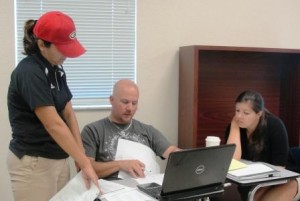
The following tips and “aha” moments came from participants in Tabor Rotation Training of Trainers Institutes. They allowed me to share them with you in hopes that they might ignite your fire for sophisticating the use of guided math groups, math stations, and differentiated instruction in math using The Tabor Rotation Framework.
Tip #1: Use Thursday and Friday to front load or pre-teach students who normally only receive remedial or intervention assistance. This gives these students the chance to be ahead instead of always feeling like they’re behind.
Tip #2: Mathematician’s Circle on Fridays is a great way to end the week. This will be the time that my class turns into a community of learners.
Tip #3: Add test prep questions to the Exit Questions after each station rotation. By doing this I’m always preparing them for the state test.
Tip #4: Self-reflection is essential, too. My on-going assessment isn’t just for my students, it’s also for me.
Tip #5: I can use FREEZE words in the classroom to get my students’ attention. I say the FREEZE word and they stop and put their hands on their shoulders.
Tip #6: Even during the daily Whole-Group Mini-Lesson you need to stop every 5-6 minutes to let students process what they have learned so far. You may need to write this into your lesson plans so you don’t forget. (I did last year, so this year I’m writing it down!)
Tip #7: If differentiated instructional experiences are based on readiness levels, learning styles, and interests, then I have to figure out my students’ learning styles and I have to build activities based on their interests.
Tip #8: I should always be open to new ideas. I want to be green & growing instead of red & rotting on the vine.
Tip #9: We don’t have a moment to spare in a school year. For example we should be sponging up minutes waiting in line by playing games that students can use non-verbal signals to answer.
Tip #10: Tabor Team Names should come from a list of really important tested words. Every student in the room has to know what the team name means and examples of it. If the team names change once a month, that’s at least 32 words they’ll master before the test.
Tip #11: Highly able, gifted, and on-level students are still at-risk if they never receive additional assistance to challenge them in ways that are best for them. They are the untapped resource in every school.
Tip #12: Just because a school is exemplary doesn’t mean that they are doing what is best for every student. If a student begins 4th grade at level 7.1 in math and leaves 4th grade at level 7.0, then we didn’t do our job. They should have been at least at level 8.1. State tests never reflect this lack of growth…
Tip #13: Tiered station activities should be the goal of every teacher beginning to use Tabor Rotation. Just begin tiering one station at a time until you’re doing all four stations.
Tip #14: I need to use a timer when teaching the Whole Group Mini-Lesson. If I don’t, my mini-lesson will turn into a maxi-lesson!
Tip #15: If I do Tabor Rotation the way it’s designed, then I’ll have at least 30 minutes meeting in a small group setting with EVERY student—that is way cool!


